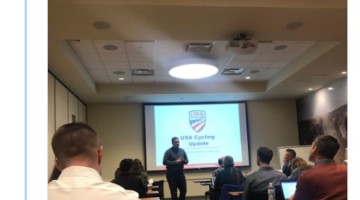Voting for USA Cycling’s Cyclocross Sport Committee is open through August 15. USAC license holders are eligible to vote for candidates depending on which type of license they hold. Cyclocross Magazine reached out to each of the candidates and offered them the opportunity to fill out a candidate questionnaire to give our readers a better understanding of what they want to do on the Cyclocross Committee.
Thomas Nee is the second of two candidates running for the commissaire position. We heard from the other candidate, Phil Miller, earlier today. In the coming days we will also hear from the at-large, coach and local association representative candidates.
Name: Thomas Nee
Residence: New York
Years as a Commissaire: 35
Cyclocross Magazine: How did you start your career as a commissaire?
Thomas Nee: During my undergraduate years, I founded a collegiate cycling club and promoted a race as part of the West Coast Conference. Lo and behold, I discovered one needed a USCF official. And what was that free lap rule all about?
So I took an officials’ class conveniently 2 miles from where I lived. I had all of $10 in my wallet, typical of a college student who worked minimum wages in a family bike shop, which is exactly what it cost to take the test. A year later, I had worked more than 50 race days mostly as chief referee. By the time I completed graduate school,I had become the world’s youngest UCI International Commissaire.
CXM: Why are you running for the ‘Cross Sport Committee?
TN: I’d like to contribute both my decades of international, national and regional cycling experience as well as business acumen to helping ’cross both at the top end get to next levels of professionalism as well as preserve the fun for the non-elite categories.
CXM: What makes you a strong candidate for this position?
TN: I have seen and been part of the growth cycles of competitive cycling through three different national federations and have a history of creating positive change. In the mid-80’s, I was the youngest non-athlete member of the USCF board of directors to complete a full term and part of the technical commission where I negotiated and drafted the legislation with Tim Nicholson (Western Conference) and Jim Young (Eastern) and a few other that created the national collegiate conference. Our vision was to keep it free for students and preserve the fun and team comradery.
In the early 90’s, I was a member the USPRO technical commission with Andy Taus, who is now a cyclocross promoter. There we helped the emerging professional circuit and teams balance the UCI requirements and the challenges of financial viability. As the first American to serve on the Tour de France jury of commissaires, I recommended, with the panel, the last 3km stage race accident rule in respect of fairness and safety. Today, I am fortunate to be part of USA Cycling’s technical commission with a great group of very qualified and wise people helping ensure US cycling prospers.
From a business standpoint, I have been a senior marketing executive for a number of decades managing budgets larger than USA Cycling’s current budget. I have intimate familiarity with what sponsors are looking for and how they are evaluated as executives. In the 90’s, I helped some pro teams with their sponsorships and promotional models. Many of the sponsors in my car at the Tour de France would have been reporting into people who reported to my position.
Finally, I take the personal effort to ensure I am fluent with the sport. Last December I followed and worked with the Belgians at five C1’s and World Cups across Flanders and Wallonia. This experience allows one to appreciate the UCI rules in context of the heart of cyclocross racing, which might not reflect what we face here.
CXM: We have seen your bio, but what’s your vision for the sport?
TN: In the early 90s in efforts to accelerate the growth of professional racing in the US, I wrote a five-page letter to the head of the Tour de France, M. Jean Marie LeBlanc. In that letter, I outlined a vision for the future where cycling would be truly global and multinational and where the Tour would need strong financial relationships with U.S.-based corporations. That vision came true. Very true.
But has domestic racing fully benefited from the growth in multinational fund sources? Some, but it is fragile. Likewise, cyclocross has seen explosive growth over the last decade. But we are starting to see turnover of riders, race organizers and sponsors. Our challenge is sustainability of the sport beyond the enthusiasm of the few who give so much for what we have today. Certain infrastructure, collaboration, organizational and managerial development education are needed. And yet we need to balance this with the need preserve what makes ’cross fun.
CXM: What are the most important issues USA Cycling needs to address right now?
TN: There is a good turnaround being led by the current leadership. They are stabilizing the organization and the financial fundamentals which are needed before growth can be readdressed. This cycle of the national federation needing to retool and rebuild has happened three times since I have been in the sport and is likely a normal cycle.
Once the organization is fully footed again, my hope is both USA Cycling and the UCI can lift themselves out of the microcosm of just our sport and address in a strategic way, as a major corporation would, the need for our sport to be competitive with other sports. Our efforts should not be squabbling among and between ourselves, but position the sport as a whole to competitively gain media time and funding from the whole pie of corporate promotional dollars.
CXM: What changes would you like to help make as a member of the Cyclocross Committee?
TN: Early to fully say. One person alone does not make a major movement. When the first time the new committee is instated and talks with each other we will have better visibility what is possible. That said, race organization growth and sustainability are first and foremost on my mind. The noticeable drop in race entries in recent years substantially impacts race organization financial structure. Both addressing the ridership levels as well as how to reduce organizational costs are likely important near term topics.
CXM: What role do you see for the commissaire representative on the Cyclocross Committee?
TN: Helping balance the desires and needs of the different stakeholders with what is practical to ensure safety and fairness are balanced with fun for the non-elite racers and financial viability for organizers and pro riders. I am not one to say more rules are better. In the mid-80s, I was one of three to vote against the new hard shell helmet rule. Not because I was against helmets but because the requirement to check for ANSI stickers was impractical and a nuisance for riders on the line.
I understand how to get the end results that achieve the spirit of a need and yet still balance what is good for most riders. For example, with the great officiating crew and One2Go at last year’s Cyclocross Nationals, we addressed one to the hottest topics in cyclocross races. We committed to not pulling lapped non-elite riders, which was successfully implemented in all but two or three of the largest fields.
CXM: What are the successes and failures of USA Cycling’s current efforts to recruit and develop commissaires?
TN: The officiating community is well aware of the negative effects of the past leadership’s implementation of CE Requirements, background checks, SafeSport testing. All good and needed things, but their hasty and poorly communicated implementation alienated many officials who already felt a lack of support from the former USAC executive team.
The new executive team has already made great strides in renewing veteran officials’ faith that things are on the upswing. The new CEO is a seasoned corporate executive – Stanford grad at that – and he shows the good managerial attributes of understanding stakeholder motivation and needs. That said we need to grow the base of officials in many parts of the country that have been left with an insufficient number of officials, leaving races understaffed, leading to burnout and in some cases, raising organizers’ costs to bring officials in from far distances. Remote internet-based education and meeting technology will help with this growth. For riders and officials alike, going to races needs to fun equally so.
Click here for more information about voting and to see all the candidates.
See below to hear from other candidates:
Cover image: flickr user MoBikeFed


























